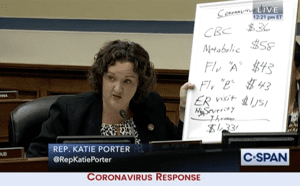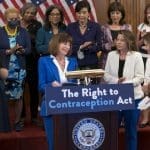Watch: Congresswoman forces CDC to agree to offer free coronavirus testing
All Americans ‘are eligible to go get tested for coronavirus and have that covered regardless of insurance,’ Rep. Katie Porter said at a Thursday congressional hearing.

On Thursday, a freshman Democratic congresswoman from California convinced the Centers for Disease Control and Prevention to offer free coronavirus testing to all Americans regardless of whether or not they have health insurance.
At a House Oversight Committee hearing, Rep. Katie Porter methodically explained both how much it would cost the average American to pay for coronavirus testing out of pocket and the legal authority of the CDC to waive those costs.
In the end, Dr. Robert Redfield, director of the CDC, agreed to invoke his authority to authorize payment for coronavirus testing fees.
Porter began her questioning by asking witnesses if they knew the cost of the typical tests needed to confirm a coronavirus diagnosis, including a Flu A, Flu B, and a visit to the emergency room.
“This all totals up to $1,331,” Porter said, “assuming they aren’t kept in isolation,” which would cost an additional $4,000.
“Fear of these costs are going to keep people from being tested, from getting the care they need, and from keeping their community safe,” she added.
Porter then explained that the CDC director has the authority to waive these costs.
“Dr. Redfield, will you commit to the CDC right now using that existing authority to pay for diagnostic testing, [making it] free to every American regardless of insurance?” Porter asked.
Redfield hedged his answer, saying he would talk to colleagues at the Department of Health and Human Services. Porter responded immediately, telling him that his answer was “not good enough.”
Porter asked Redfield four separate times to invoke his authority. After the fourth question, Redfield committed to doing so.
“I think you’re an excellent questioner,” Redfield told Porter, “so my answer is yes.”
An obviously happy Porter then reiterated what Redfield just committed to.
“Excellent! Everybody in America, hear that,” Porter said. “You are eligible to go get tested for coronavirus and have that covered regardless of insurance.” Porter encouraged Americans to follow CDC guidelines, such as calling a doctor’s office before arriving.
“Do not let a lack of insurance worsen this crisis,” she added.
The legal authority Porter was referring to is found in 42 CFR 71.30, part of the code of federal regulations relevant to the CDC. Porter read out part of the regulation at the hearing, which states that the CDC director “may authorize payment for the care and treatment of individuals subject to medical exam, quarantine, isolation, and conditional release.”
The Trump administration has struggled to provide an adequate number of tests to health care professionals around the country.
On Feb. 13, Health and Human Services Secretary Alex Azar announced that the CDC was working with five cities to test for the coronavirus, but the tests didn’t work.
Almost a month after that announcement, an investigation by the Atlantic was only able to identify 4,384 people who had been tested in the entire country. In the early phase of the outbreak, the CDC has strict requirements as to who could be tested, with some health care experts telling the Atlantic that such requirements meant many cases went unreported.
Instead of reporting new cases, the government should “refer to them as ‘newly discovered cases,’ in order to remove the impression that the number of cases reported has any bearing on the actual number,” Marc Lipsitch, an epidemiology professor at Harvard, told the Atlantic.
In a visit to the CDC, Donald Trump promised coronavirus testing to anyone who needed it, but Vice President Mike Pence refused to make the same commitment during Thursday morning television interviews, only saying that companies were in the process of producing more tests.
The Atlantic investigation concluded that the lack of testing will hurt the ability of health care providers to slow the spread of the outbreak.
It was unclear at the hearing when CDC would implement the commitment Redfield made to Porter regarding covering the costs of coronavirus testing.
Published with permission of The American Independent Foundation.
Recommended

Biden campaign launches new ad focused on Affordable Care Act
Former President Trump has said he wants to do away with the popular health care law.
By Kim Lyons, Pennsylvania Capital-Star - May 08, 2024
Ohio doctors fear effects of emergency abortion care case set to go before U.S. Supreme Court
A federal law that allows emergency departments to treat patients without regard to their ability to pay will be under U.S. Supreme Court scrutiny this week, and Ohio doctors are concerned about the case’s local impact on emergency abortion care.
By Susan Tebben, Ohio Capital Journal - April 23, 2024
House GOP votes to end flu, whooping cough vaccine rules for foster and adoptive families
A bill to eliminate flu and whooping cough vaccine requirements for adoptive and foster families caring for babies and medically fragile kids is heading to the governor’s desk.
By Anita Wadhwani, Tennessee Lookout - March 26, 2024


















































































